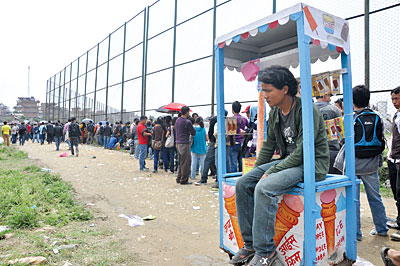 BIKRAM RAI |
Thousands of Nepali men and women, youths and adults alike, flocked to apply for Korean language tests at three centers in the capital this week, in hopes of being recruited for South Korean jobs. An estimated 60,000 are applying for 7,100 vacancies from Nepal in the 3D category: dirty, dangerous and difficult.
The daily queues for passports at the Foreign Ministry and the huge lines of people at the four venues indicate that despite reports of exploitation, cheating by middlemen, low pay and hardships, Nepalis are more desperate than ever to get out of here.
"Bideshinu rahar hoina, badhyata ho," sums up Surya Man Lama, 21, a private-college graduate. That is the general refrain up and down the line: we don't like to go abroad, we are forced to. Lama says there is no reason to stay back because he sees his seniors loitering in the neighborhood unable to find jobs. Restaurateur Ganesh Lama, 34, and Tara Devi Khadka, 30, from Pokhara also say they have to find a job abroad to take care of their three children.
Over at the Labour Department, an official seemed encouraged that there were new job openings for Nepalis in South Korea: "The labour laws are better in South Korea than in the Gulf countries, which is why we have taken the initiative to provide youths with opportunities for employment."
According to 2011 ILO report, almost 40 per cent of Nepal's population will come of working age in the next 15 years. But the government looks more eager to drive them out instead of providing them with work and security at home. Article 18 of Nepal's interim constitution defines rights to employment and social security for all citizens as fundamental rights. It is ironic that this nation survives on the money sent back by the same people whom it has failed to provide for. The strategy of successive governments has been to manage Nepal's growing unemployment with a mass exodus, not just of the working population but the critical mass that keeps a check on the political leadership.
From a carpet-exporting and rice-producing nation, we have become traffickers of our own people. Nepali women who go abroad to work as domestics are often subjected to abuse and forced into prostitution while young men recruited as security guards by "manpower" companies often find themselves smuggled into war zones in Afghanistan and Iraq.
Five hundred Nepalis fly out everyday from TIA to work in foreign countries. No one has ever counted the numbers who go overland to India. Around 20 per cent of Nepal's population work abroad at any given time. Their meagre savings (because few earn what they are promised by the middlemen in Kathmandu) barely pay for the money they invested to go abroad. So they are forced to stay until they salvage their outlay.
It has become fashionable these days to talk of peace and the constitution, as if writing the constitution in time or finding a way to integrate the armies will resolve the problems that are forcing the tens of thousands of people in the queues to flee the country. The plight of Nepal's youth is not just a result of existing political stalemate but a by-product of consistently bad politics in the last two decades of democracy.
Most of these young men and women are from the districts, farmers who till recently were feeding Nepal's urban population. The failure of the government to improve agriculture, spread irrigation, boost harvests and ensure fair prices for produce has forced them off the land. The fallow fields in the countryside are a testament to the absence of able-bodied youth to work the farms. Bad politics has held hydropower hostage, investors are scared away by militant unions and extortion. Without new investment there are no new off-farm jobs being created.
We may yet get a new constitution by the end of this month. But what good will that do? Unless this haemmorhage of young people is reversed, there will be nobody left to lay the foundation of the New Nepal that our political leadership has been ranting on about.
It's tempting to say: last one out turns off the lights. But there are no lights to turn off.
Read also:
Delayed constitution better than flawed constitution, EDITORIAL
Who cares?, DAMAKANT JAYSHI
See also:
Helping workers abroad



